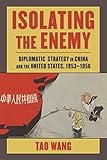Isolating the Enemy : Diplomatic Strategy in China and the United States, 1953–1956 / Tao Wang.
Material type: TextSeries: Studies of the Weatherhead East Asian Institute, Columbia UniversityPublisher: New York, NY : Columbia University Press, [2021]Copyright date: ©2021Description: 1 online resource : 9 b&w figuresContent type:
TextSeries: Studies of the Weatherhead East Asian Institute, Columbia UniversityPublisher: New York, NY : Columbia University Press, [2021]Copyright date: ©2021Description: 1 online resource : 9 b&w figuresContent type: - 9780231552516
- 327.7305109/045 23
- online - DeGruyter
| Item type | Current library | Call number | URL | Status | Notes | Barcode | |
|---|---|---|---|---|---|---|---|
 eBook
eBook
|
Biblioteca "Angelicum" Pont. Univ. S.Tommaso d'Aquino Nuvola online | online - DeGruyter (Browse shelf(Opens below)) | Online access | Not for loan (Accesso limitato) | Accesso per gli utenti autorizzati / Access for authorized users | (dgr)9780231552516 |
Frontmatter -- CONTENTS -- ACKNOWLEDGMENTS -- ABBREVIATIONS -- Prologue -- Introduction -- PART I: Geneva Conference -- Chapter One Neutralizing Indochina -- Chapter Two Between the Unattainable and the Unacceptable -- PART II: Taiwan Strait Crisis -- Chapter Three Preventing the Mutual Defense Treaty -- Chapter Four “A Horrible Dilemma” -- PART III: Bandung Conference -- Chapter Five Formulating a Zone of Peace -- Chapter Six A Blessing in Disguise? -- Conclusion: The Ambassadorial Talks -- Epilogue -- Appendix COUNTRIES THAT ESTABLISHED DIPLOMATIC RELATIONS WITH THE PRC BY 1957 -- NOTES -- BIBLIOGRAPHY -- INDEX
restricted access online access with authorization star
http://purl.org/coar/access_right/c_16ec
In the crucial moment after the Korean War, the United States and the People’s Republic of China circled each other warily. They shifted between confrontation and conciliation, ratcheting up tension yet also embarking on peace initiatives.Tao Wang offers a new account of Sino–American relations in the mid-1950s that situates the two great powers in their international context. He reveals how both the United States and China adopted a policy of attempting to isolate their adversary and explores how Chinese and American leaders perceived and reacted to each other’s strategies. Although the policy of the Eisenhower administration was to contain China, Washington often overestimated Chinese aggressiveness, worrying allies and neutral states. Sensitive to the differences within the Western camp, Chinese leaders sought to convince American allies to persuade the United States to back down. Wang analyzes diplomatic maneuvering over a peace settlement in Indochina, an American defense pact with Taiwan, and the anticolonial Bandung Conference, showing how political pressure pushed American leaders to make concessions. He challenges the portrayal of Communist states as driven by ideology, showing that Chinese leaders adopted a pragmatic policy during these crucial years.Drawing on Chinese, Taiwanese, Russian, Vietnamese, British, and American archival material, including reclassified Chinese Foreign Ministry documents, Isolating the Enemy offers new insight into Chinese diplomacy in the 1950s and U.S. foreign policy under the Eisenhower administration through a nuanced portrayal of Sino–American interactions.
Mode of access: Internet via World Wide Web.
In English.
Description based on online resource; title from PDF title page (publisher's Web site, viewed 01. Dez 2022)


